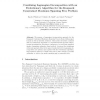Free Online Productivity Tools
i2Speak
i2Symbol
i2OCR
iTex2Img
iWeb2Print
iWeb2Shot
i2Type
iPdf2Split
iPdf2Merge
i2Bopomofo
i2Arabic
i2Style
i2Image
i2PDF
iLatex2Rtf
Sci2ools
121
click to vote
EVOW
2007
Springer
2007
Springer
Combining Lagrangian Decomposition with an Evolutionary Algorithm for the Knapsack Constrained Maximum Spanning Tree Problem
We present a Lagrangian decomposition approach for the Knapsack Constrained Maximum Spanning Tree problem yielding upper bounds as well as heuristic solutions. This method is further combined with an evolutionary algorithm to a sequential hybrid approach. Experimental investigations, including a comparison to a previously suggested simpler Lagrangian relaxation based method, document the advantages of the new approach. Most of the upper bounds derived by Lagrangian decomposition are optimal, and together with the evolutionary algorithm, large instances with up to 12000 nodes can be either solved to provable optimality or with a very small remaining gap in reasonable time.
Artificial Intelligence | EVOW 2007 | Lagrangian Decomposition | Lagrangian Decomposition Approach | Upper Bounds |
| Added | 07 Jun 2010 |
| Updated | 07 Jun 2010 |
| Type | Conference |
| Year | 2007 |
| Where | EVOW |
| Authors | Sandro Pirkwieser, Günther R. Raidl, Jakob Puchinger |
Comments (0)

